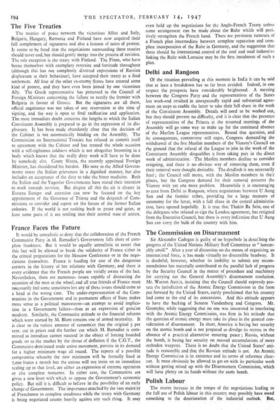Delhi and Rangoon
Of the situation prevailing at this moment in India it can be said that at least a breakdown has so far been avoided. Indeed, in one respect the prospects have considerably brightened. A meeting between the Congress Party and the representatives of the States last week-end resulted in unexpectedly rapid and substantial agree- ment on steps to enable the latter to take their full share in the work of the Constituent Assembly. Details will need to be worked out, but they should present no difficulty, and it is clear that the presence of representatives of the Princes at the resumed meetings of the Assembly will go some way to make up for the continued absence of the Muslim League representatives. Round that question, and its consequences, controversy still rages, Congress demanding the withdrawal of the five Muslim members of the Viceroy's Council on the ground that the refusal of the League to join in the work of the Constituent Assembly disqualifies it from taking part in the direct work of administration. - The Muslim members decline to consider resigning, and there is no obvious way of removing them, even if their removal were thought desirable. The deadlock is not necessarily final ; the Council still meets, with the Muslim members in their places, but the Congress demand for their removal presents the Viceroy with yet one more problem. Meanwhile it is encouraging to turn from Delhi to Rangoon, where negotiations between U Aung San and the frontier tribes, providing for a large measure of autonomy for the latter, with a full share in the central administia- tion, have opened hopefully. It is true that Thakin Ba Sein, one of the delegates who refused to sign the London agreement, has resigned from the Executive Council, but there is every indication that U Aung San can carry the bulk of the country with him. -


































 Previous page
Previous page